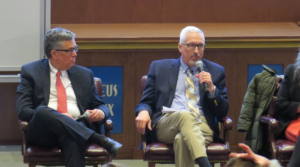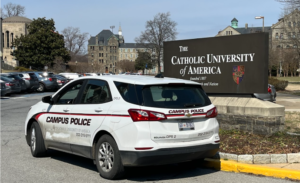Clean Water and Potholes – Infrastructure Rollout

Image Courtesy of Carolyn Kaster
By Chris Carey
Finally, the potholes plaguing anyone who drives through Washington, DC might be taken care of, as the implementation of the vast bipartisan infrastructure package, the “Infrastructure Investment and Jobs Act,” has begun, following President Biden’s signature.
The considerable spending package, labeled at a whopping $1.2 trillion investment, will place much of the money into the hands of the states for projects guaranteeing the elimination of lead lines delivering water to households and communities, clean drinking water for the entire nation, access to high-speed broadband internet across the entire country, physical infrastructural improvements on roads and bridges, public transportation overhauls with a mind to sustainability, bolstering of supply chains, increasing and strengthening of passenger rail, increased access to electric vehicle charging stations, better clean energy, preparation infrastructurally for challenges brought by climate change, and renewed efforts at cleaning areas of pollution for posterity.
Much of the bipartisan infrastructure framework (BIF) focuses on the environment as a key part of building for the long-term future. Climate action has been a cornerstone of Biden’s administration, from reentry to the Paris Climate Accords to participation at the recent COP26 conference, and is underscored by the very real action the administration is taking within the BIF itself.
As mentioned above, however, much of the implementation of the infrastructure framework will rest in each individual state’s ability to mobilize and invest the allocated funds. As with typical federal programs, money will be distributed to the states and used based on individual projects’ abilities to qualify for that federal funding under the established guidelines in the Infrastructure Investment and Jobs Act.
As Vox reports, this money will be largely released to individual states. Some of this funding will be directed through pre-existing mediums such as the Drinking Water State Revolving Fund, and the Highway Safety Improvement Fund. Additionally, according to the Department of Transportation, some of the funding will be made available to states in as soon as six months, with some grant applications for the newly approved money following the same timeline.
In some more local news, Mitch Landrieu, former Lieutenant Governor of Louisiana and Former Mayor of New Orleans, was announced as Senior Advisor to the President and Infrastructure Coordinator. Landrieu, who graduated from Catholic University in 1982, will be responsible for overseeing the rollout of the new funding across the United States and will serve as a Senior Advisor to President Biden through the process. Landrieu’s experience in helping New Orleans recover from Hurricane Katrina was a major contributor in his selection, per the White House.
Noted for its bipartisan nature, this new law is by no means a bridge between the ever-widening partisan gap in the nation. Only 13 Republican lawmakers in the House of Representatives voted in favor of the monumental legislation, and those in the House and the Senate who did vote in favor largely decided to not attend the signing ceremony hosted at the White House. Representative Andrew Garbarino (NY-02) received a death threat that contributed to his decision on the matter. Some Republicans did attend the event, but the divisive nature of this bipartisan bill only highlights the height of partisanship the country has achieved.
As Build Back Better looms in the Senate, the Biden administration is working hard to spin its fast-falling approval numbers with lasting investment in human capital and physical infrastructure. If done right, there is a real chance for a positive talking point for Democrats in what promises to be a difficult midterm election cycle.






